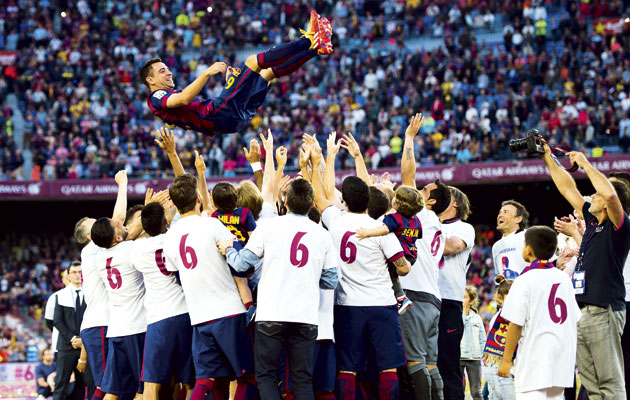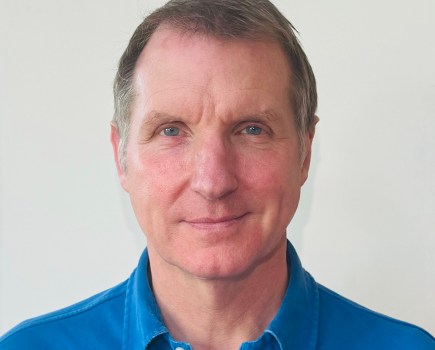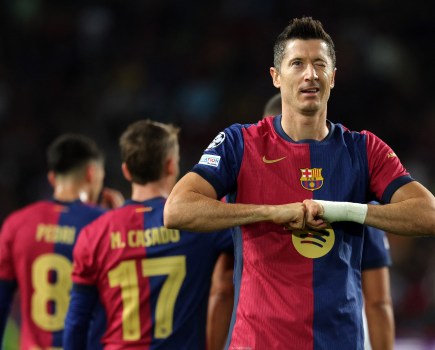How is life in Qatar?
Phenomenal. It’s perfect. I have been pleasantly surprised. The technical and competitive level is remarkably high and the professionalism is good. It lacks a little on the tactical side and the organisational side is more relaxed, but, in general, it is extraordinary.
Your new team-mates must treat you with reverence…
I’ve felt a lot of respect, including from the coach, who is always looking out for me. But
I want to be a regular member of the squad; having privileges does not appeal to me. Anyway, on the pitch, they are tough. Sometimes they go flying in; they see the ball and clean out two people in the way.
Does misplacing passes still bother you?
More than anything – besides losing, obviously. I go home angry if I misplace passes. I want to win practice matches, but by playing good football. I am not interested in winning at all costs.
If you become a coach, would you use the same style as Barcelona?
My philosophy is clear: be dominant, don’t speculate, press high and close down the opposition’s passing options. Obviously, Qatar is different to Barcelona. At La Masia you look for players for a 4-3-3 or a 3-3-4. In Qatar you have to use what’s there. If there are
two good forwards, you have to spread them around. The Spain national team has done that too. Iniesta is often played on the wings and Silva is not a forward, but they can play in these positions because they are top class.
Being a coach can be frustrating; achieving victory will not always depend on you..
Being a coach is difficult. You have to think for your 25 players, as a psychologist and as a motivator. That’s the reason I’m preparing in Qatar. As a footballer, you turn up at training and then you play. As a coach, you have to plan a lot. But still it attracts me. I know they are going to demand a lot so I must prepare for it. Maybe I will serve more as sports director, I do not know yet.
Would you like to have had better long-range passing?
It’s not something I’m known for but I do play a lot of long-range passes. One thing I would have liked is to be faster, to be able to burst away from players with a change of pace, like Andres [Iniesta]. I can’t get away from anyone! I have to turn away or feint instead. That’s meant I’ve always had to think more than others and read the game.
Is La Masia in crisis?
Never. La Masia cannot keep producing generations as we have in recent years. That was exceptional. Barca is a club that develops players, but always has to win trophies. In a year when they do not win anything, you have to sign a player from outside. But this year they won everything, so maybe it’s time for Munir, Sandro or Samper.
What do you remember most from last year, when Barca turned things around after the defeat at Real Sociedad?
Luis Enrique was very humble. His reaction surprised me. He’s a very emotional person and yet he did all the right things, reaching out to everyone, including Leo Messi. That’s when it dawned on me that coaches are supporting actors and it’s only the players who can get angry and have problems. Luis understood that, he talked to the players. Communication is fundamental.
It was Luis Enrique who persuaded you to stay last term – and you won the treble…
He was frank. He said he needed me in the dressing room, but at my age I was only going to play when I was needed. I came back from holiday and he convinced me even though I had already made my decision to leave. And look what happened then.
How do you rate the job that Luis Enrique has done?
Very good. He’s a demanding man. When something fails you have to put a firecracker up people’s backsides, it works. You have to be demanding in the dressing room.
Louis Van Gaal did that too, didn’t he?
I will remember him all my life, but for better not worse. He was very direct. One day he would bury you and humiliate you in front of the group, and the next day he would tell me
I was Zidane. That is the way he is and in time it has a positive effect. Under him I went from playing at Old Trafford to going to play at [third division] Alcoyano when he dropped me back down to Barca B. That is something that has been lost. Now if you are in the first team it’s taken for granted that you will not go back down [to the reserves]. That’s wrong. A kid of 18 has to play. That way, when you get back in the first team, you are hungrier than ever.
What one thing stands out most for you from all your years in the game?
All the silverware I’ve won and the privilege of playing, for example, in a Champions League Final. I’ve won a lot, given a lot and I respect the game. It isn’t only the titles I’ve won, but how I won them.
What was it like before the game changed in favour of smaller players?
They were hard times. Getting through toughened you up. Others might have given up but I have quite a strong character. I’m a huge fan of Barca and Spain’s playing style.
Interview by Oscar Campillo & Juan Castro/ESM








